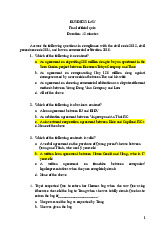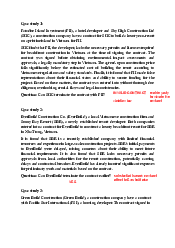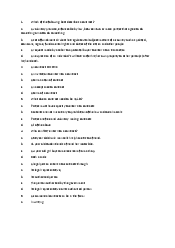

Preview text:
QUIZZ 2 QUESTIONS
1. Which one of the following is NOT an advantage of franchising for the franchisee?
A. established product or service
B. technical and managerial assistance C. quality control standards D. expansion
2. Which of the following is a disadvantage for the franchisor? A. franchisee motivation B. bulk purchasing
C. loss of freedom and control as franchise system grows
D. use of capital for reasons other than expansion
3. All of the following are disadvantages of franchising for the franchisee, except for:
A. service costs imposed by the franchisor
B. franchisor failure to meet support expectations of the franchisee
C. typically operate as a non-unionize business establishment
D. restrictions on freedom of ownership
4. A number of major questions should be addressed by a potential franchisor before
choosing to expand through franchising. Which one of the following is not a major question at the onset?
A. do I have a prototype store or unit that can be replicated?
B. can my product/service meet the test of distance?
C. should I have right of first-refusal on site selection?
D. what skills will be needed by a franchisee to run my business successfully?
5. There are several ways to protect a trademark, as indicated below. Which descriptive
statement is NOT one of the legal ways of protecting a trademark? A. coined trademark B. descriptive trademark C. suggestive trademark D. trouble-free trademark
6. Reasons a franchise system would have corporate locations, as well as franchisee
locations are shown below, except for:
A. investors believe corporate ownership demonstrates that the franchise concept works.
B. franchisor avoids potential conflict with franchisees that may rise based upon market and site locations.
C. by having some corporate locations, the franchisor could take over, if a troubled
or failing franchisee’s location, if necessary.
D. by having corporate location, the franchisor remains close to the ultimate customer.
7. Business situations that are appropriate to consider when looking for growth through
franchising include all but which one of the following?
A. firms in market niches that have broad product appeal and known consumer
acceptance as long as the trends support long-term market viability and growth.
B. firms in stable and growing industries, where the industry itself is unburdened by significant regulation.
C. firms that have complex internal systems to execute, that draw from a limited pool
of qualified employees, or require significant amounts for training to assure
franchisee competence in delivery of the system’s products or services.
D. firms whose operating margins allow for franchisee fees to be charged and still
leave an adequate r.o.i. for both franchisor and franchisee.
8. If a franchise system is struggling, not achieving long-term success. The first step for the franchisor to do is:
A. revisit and maybe change the franchisee business model
B. contact and listen to each franchisee as possible, to determine what are the problems to be addressed.
C. change the corporate business model, reduce corporate costs and reduce contact with franchisees.
D. study what the competition is doing and change the franchise model to fit the
models of its primary competitors.
9. Capital requirements that a potential franchisee must consider prior to becoming part
of a franchise system include each of the following except for: A. franchising fee
B. startup expanses and inventory
C. personal entertainment expenses D. working capital
10. A primary consideration for a potential franchisee is that the capital required to
become a franchisee will likely be:
A. much greater than it would be for starting an independent business in the same field.
B. much less than it would be for starting an independent business in the same field
C. the amount of capital required is not of great concern to franchisor or franchisee.
other factors are more important.
D. about the same or potential more for starting a franchise business compared to
starting an independent business in the same field.




